2013年仁爱英语七年级下 总复习 三
- 格式:doc
- 大小:38.50 KB
- 文档页数:4
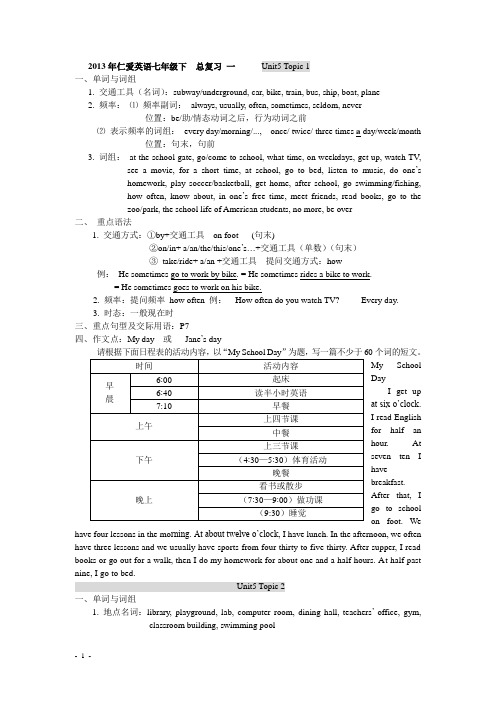
2013年仁爱英语七年级下总复习一Unit5 Topic 1一、单词与词组1. 交通工具(名词):subway/underground, car, bike, train, bus, ship, boat, plane2. 频率:⑴频率副词:always, usually, often, sometimes, seldom, never位置:be/助/情态动词之后,行为动词之前⑵表示频率的词组:every day/morning/..., once/ twice/ three times a day/week/month位置:句末,句前3. 词组:at the school gate, go/come to school, what time, on weekdays, get up, watch TV,see a movie, for a short time, at school, go to bed, listen to music, do one’shomework, play soccer/basketball, get home, after school, go swimming/fishing,how often, know about, in one’s free time, meet friends, read books, go to thezoo/park, the school life of American students, no more, be over二、重点语法1. 交通方式:①by+交通工具on foot (句末)②on/in+ a/an/the/this/one’s…+交通工具(单数)(句末)③take/ride+ a/an +交通工具提问交通方式:how例:He sometimes go to work by bike. = He sometimes rides a bike to work.= He sometimes goes to work on his bike.2. 频率:提问频率how often 例:---How often do you watch TV? ---Every day.3. 时态:一般现在时三、重点句型及交际用语:P7四、作文点:My day 或Jane’s day个词的短文。
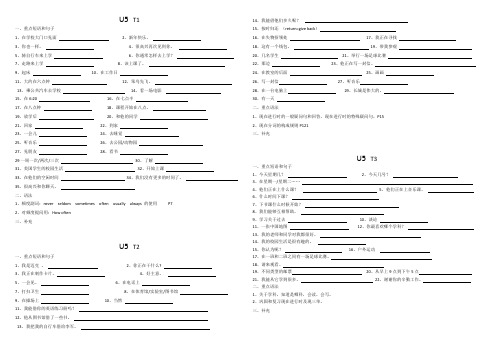

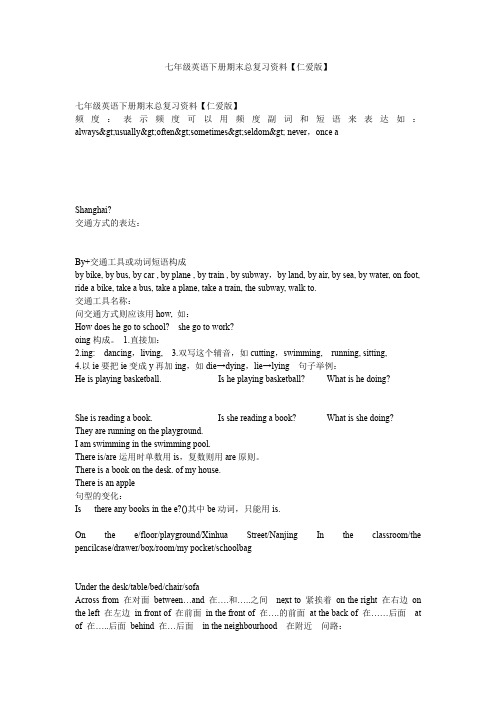
七年级英语下册期末总复习资料【仁爱版】七年级英语下册期末总复习资料【仁爱版】频度:表示频度可以用频度副词和短语来表达如:always>usually>often>sometimes>seldom> never,once aShanghai?交通方式的表达:By+交通工具或动词短语构成by bike, by bus, by car , by plane , by train , by subway,by land, by air, by sea, by water, on foot, ride a bike, take a bus, take a plane, take a train, the subway, walk to.交通工具名称:问交通方式则应该用how, 如:How does he go to school? she go to work?oing构成。
1.直接加:2.ing: dancing,living,3.双写这个辅音,如cutting,swimming, running, sitting,4.以ie要把ie变成y再加ing,如die→dying,lie→lying 句子举例:He is playing basketball. Is he playing basketball? What is he doing?She is reading a book. Is she reading a book? What is she doing?They are running on the playground.I am swimming in the swimming pool.There is/are运用时单数用is,复数则用are原则。
There is a book on the desk. of my house.There is an apple句型的变化:Is there any books in the e?()其中be动词,只能用is.On the e/floor/playground/Xinhua Street/Nanjing In the classroom/the pencilcase/drawer/box/room/my pocket/schoolbagUnder the desk/table/bed/chair/sofaAcross from 在对面between…and 在….和…..之间next to 紧挨着on the right 在右边on the left 在左边in front of 在前面in the front of 在….的前面at the back of 在……后面at of 在…..后面behind 在…后面in the neighbourhood 在附近问路:Is there a post office near here?Where is the post office ,please ?How can I get to post office?指路:It’s over there .to the end.时间表达:几点:介词at+点钟(几点的表达有两种,顺读和逆读,逆读有两种情况,一用past,小于或等于30分时,二用to,大于30分时,此时整点部分应该加1)如:at six at twelve at ten past eight at a quarter past eighthalf past eight fifteen to eleven 注:顺读:10:40 ten forty哪天:用介词on+星期或日期(日期的表达,英式是:the+序数词的日+of+月份,美式是:月份+the+序数词的日)如:on Monday on Friday on April the tenth on the ninth of April序数词:first第一second第二third第三fifth eighth第八ninth第九twelfth第十二twentieth第二十twenty-first第二十一twenty-second 第二十二twenty-third哪年、哪月、哪个季节:介词用in 读)In 1996——in nineteen ninety-six谈论能力:使用情态动词can do sth. Sb can’t do sthCan sb do sth?动词过去式变1. watched looked2. lived loved liked danced3.y为i ,ed worried carried5. A—A A—B 型was are——were have/has——had go——went did+动词的过去式+其它。
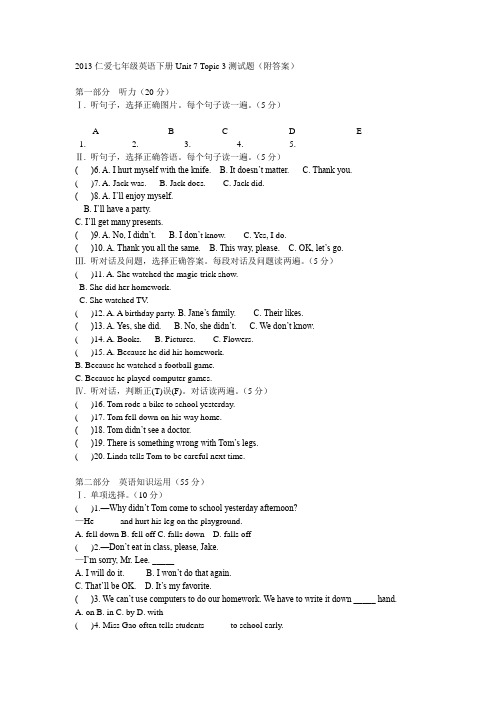
2013仁爱七年级英语下册Unit 7 Topic 3测试题(附答案)第一部分听力(20分)Ⅰ. 听句子,选择正确图片。
每个句子读一遍。
(5分)A B C D E1. ________2. ________3. ________4. ________5. ________Ⅱ. 听句子,选择正确答语。
每个句子读一遍。
(5分)( )6. A. I hurt myself with the knife. B. It doesn’t matter. C. Thank you.( )7. A. Jack was. B. Jack does. C. Jack did.( )8. A. I’ll enjoy myself.B. I’ll have a party.C. I’ll get many presents.( )9. A. No, I didn’t. B. I don’t know. C. Y es, I do.( )10. A. Thank you all the same. B. This way, please. C. OK, let’s go.Ⅲ. 听对话及问题,选择正确答案。
每段对话及问题读两遍。
(5分)( )11. A. She watched the magic trick show.B. She did her homework.C. She watched TV.( )12. A. A birthday party. B. Jane’s family. C. Their likes.( )13. A. Y es, she did. B. No, she didn’t. C. We don’t know.( )14. A. Books. B. Pictures. C. Flowers.( )15. A. Because he did his homework.B. Because he watched a football game.C. Because he played computer games.Ⅳ. 听对话,判断正(T)误(F)。

仁爱版七年级下册英语复习知识点仁爱版七年级下册英语复习知识1重点语法There be句型Wh-questions重点句型What’s your home like? What’s the matter?Sorry, I can’t hear you. I’ll get someone to check it right now.There is something wrong with mykitchen fan.重点讲解1 house with three bedrooms.有三间卧室的房子。
with “有,带有”。
with还可以意为“和(某人/某物)在一起”2 apartment for a family of two.适合两口之家的公寓。
(1) for表示“给……”表示目的或功能。
后接物主代词或名词,但通常带’s.或者后接表示无生命物体的名词。
Here is a letter foryou.(2)of的含义为“属于某人/某事物”。
She is a friend of Lily’s. = She is Lily’s friend.3 What’s the matter?怎么了?该句常用来询问某或某物出了什么什么问题或毛病;询问具体某人或某物出了什么问题时,还可以表达为:What’s the matter with sb./sth.某人或某物出了什么毛病。
What’s the matter? = What’swrong?4 Ihear you playing the piano.我听见你在弹钢琴。
hear…doing sth.“听见……在做某事”,强调正在进行的动作。
hear…dosth.“听见……做了某事”,强调全过程。
hearabout sth.听到关于某事物的消息 hear from sb.接到某人的来信、电话等hear of sb./sth.听到或知道某人或某事物的情况5 a lot of = lots of许多后接可数名词,相当于many;后接不可数名词,相当于much,用于肯定句中;但是注意:如果是否定句,则常用many或much.6 be far from… 离……远(抽象距离)be…away from…离……远(具体距离)My school is not far from thebookstore. The sea is 2 miles away fromthe hotel.7 There is something wrong with sb./sth.某人或某物出问题/有毛病了。
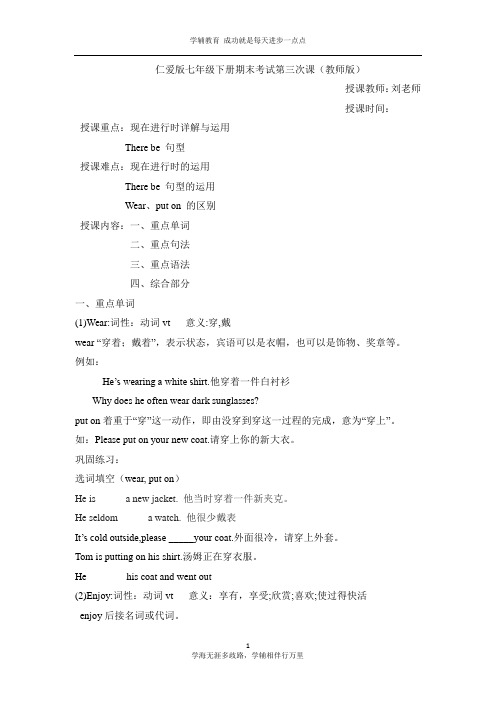
仁爱版七年级下册期末考试第三次课(教师版)授课教师:刘老师授课时间:授课重点:现在进行时详解与运用There be 句型授课难点:现在进行时的运用There be 句型的运用Wear、put on 的区别授课内容:一、重点单词二、重点句法三、重点语法四、综合部分一、重点单词(1)Wear:词性:动词vt 意义:穿,戴wear “穿着;戴着”,表示状态,宾语可以是衣帽,也可以是饰物、奖章等。
例如:He’s wearing a white shirt.他穿着一件白衬衫Why does he often wear dark sunglasses?put on着重于“穿”这一动作,即由没穿到穿这一过程的完成,意为“穿上”。
如:Please put on your new coat.请穿上你的新大衣。
巩固练习:选词填空(wear, put on)He is _____ a new jacket. 他当时穿着一件新夹克。
He seldom _____ a watch. 他很少戴表It’s cold outside,please _____your coat.外面很冷,请穿上外套。
Tom is putting on his shirt.汤姆正在穿衣服。
He _______ his coat and went out(2)Enjoy:词性:动词vt 意义:享有,享受;欣赏;喜欢;使过得快活enjoy后接名词或代词。
【例如】:They are enjoying their dinner.他们在津津有味地吃饭。
Do you enjoy the film?你喜欢这部电影吗?enjoy后面可接动词的-ing形式。
【例如】:I enjoy listening to light music.Do you enjoy reading?你喜欢读书吗?判断正误:He enjoys play football.He enjoys to play football.He enjoys playing footballenjoy后面可接反身代词(oneself),构成固定搭配enjoy oneself,意为“过得愉快、玩得高兴” ,相当于have a good time。

七年级下学期期末考试试卷英语命题人:王贝第Ⅰ卷一、听力(共20分)第一节、根据所听到的内容,选择相应的图画。
( 共5小题,每小题1分)( )1.A B C ( )2.A B C( )3.A B C( )4.A B C( )5.A B C第二节、听下面的对话,从题中所给的A. B. C三个选项中选出最佳答案。
(共5小题,每小题1分)( ) 6. How is the weather today?A. It‟s sunny.B. It‟s cloudy.C. It‟s rainy. ( ) 7. Where did the woman go last Sunday?A. To the shopB. To a parkC. To school( ) 8. How‟s it going with Mary?A. GreatB. Not badC. Pretty good ( ) 9. Is David tall and thin?A. Yes, he is.B. No, he isn‟t.C. I don‟t know. ( ) 10. What would the man like?A. Noodles with beef and tomatoes.B. Beef and tomatoes noodles.C. Dumplings with beef第三节、听录音,回答问题。
录音读两遍(共5小题,每小题2分)Ⅰ听下面一段较长对话,回答第11—13小题。
( ) 11. How does Maria like the scarf?A. She can‟t stand it.B. She likes it.C. She doesn‟t mind it. ( ) 12. How many things are mentioned (提到) here in this dialogue?A. Three.B. Four.C. Five.( ) 13. Who is Li Dan?A. She is a Japanese girl.B. She is a Chinese boy.C. She is an American girl.D. She is a Chinese girl.Ⅱ听独白,回答14-15小题。

仁爱版英语七年级下册知识点复习归纳仁爱版英语七年级下册知识点复习归纳(完整版)仁爱版英语七年级下册知识点归纳英语七年级下册知识点归纳Unit 5 Topic1重点语法一般现在时(常与频度副词never, seldom, sometimes, often,usually, always等连用)重点句型—How do you usually come to school?—I usually come to school by subway.—How often do you go to the library?—Once/Twice/Three times a week/Very often/Every day/Seldom重点详解1I always come to school by bus.by+交通工具名称,表示使用某种交通方式,中间不加限定词,如果交通工具前有a, the, my等限定词,就不能用by,而是用in或是on.on the train=by train on his bike=by bike in my car=by car.巧辩异同on foot与w alk on foot“走路”,是介词短语,不能作谓语,只作方式状语,位于句末。
walk“走路”,是动词,可以作谓语。
goto…onfoot= walk toI often go to school on foot. =I often walk to school.仁爱版英语七年级下册知识点复习归纳(完整版)同样,go to….bybike = ride a bike togoto….by car = drive a car togo to…by plane = fly togoto…b y bus = take a bus to2 Come on!It’stime for class. come on“快点,加油,来吧”。
It’stime for sth.“该做某事了”,与It’stime to do sth.意思一样。
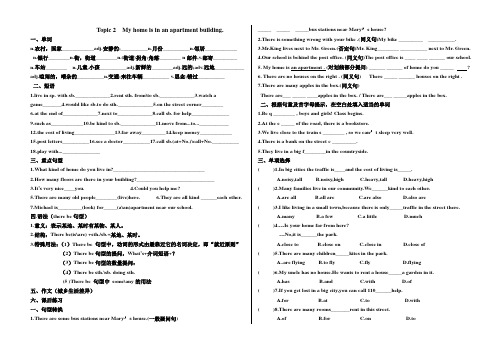
Topic 2 My home is in an apartment building.一、单词n.农村,国家____________adj.安静的;__________n.月份__________n.邻居____________ n.银行________n.街,街道________n.(街道)拐角;角落________ n邮件,v.邮寄_________ n.车站________ n.儿童,小孩__________adj.新鲜的________adj.远的;adv.远地___________ adj.喧闹的,嘈杂的__________n.交通;来往车辆__________ v.思念;错过__________二、短语1.live in sp. with sb._____________2.rent sth. from\to sb._____________3.watch agame_______4.would like sb.to do sth._____________5.on the street corner________6.at the end of_____________7.next to_____________8.call sb. for help______________9.such as____________10.be kind to sb._____________11.move from...to...___________12.the cost of living_______________13.far away_________14.keep money____________ 15.post letters__________16.see a doctor__________17.call sb.(at+No.)\call+No.__________18.play with...______________三、重点句型1.What kind of home do you live in?__________________________________2.How many floors are there in your building?_____________________________3.It’s very nice____you.4.Could you help me?5.There are many old people________(live)here.6.They are all kind ______each other.7.Michael is_________(look) for_____(a\an)apartment near our school.四.语法(there be句型)1.意义:表示某地、某时有某物、某人。
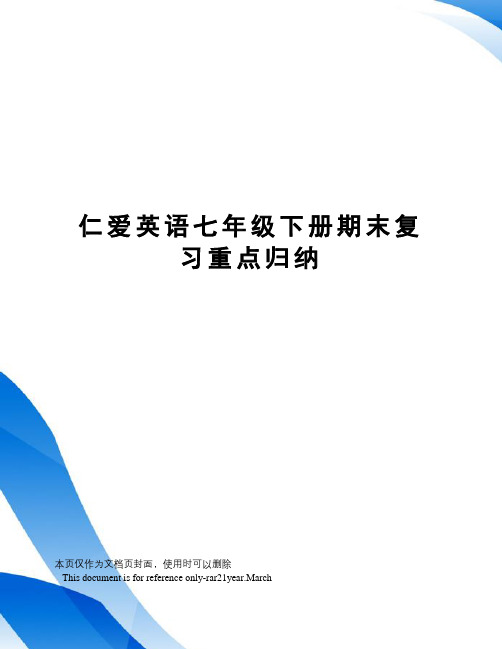
仁爱英语七年级下册期末复习重点归纳本页仅作为文档页封面,使用时可以删除This document is for reference only-rar21year.March仁爱英语七年级下册期末复习重点归纳一、名词复数.photo- photos child-children foot-feet tooth- teeth knife-knives baby-babies 家庭family-families 马铃薯 potato----potatoes 树叶leaf---leaves德国人German s二、一般现在时中单数第三人称动词构造1. 直接加s (元音字母+y 直接加)likes, wants, plays, stays, enjoys, buys2. s, x, sh, ch ,o结尾加 es-------teaches, watches, washes , passes, goes, does3. 辅音字母+y ,去y改i加es study---studies, fly---flies, carry---carries,三、现在进行时be + V-ing (现在分词)现分词词特殊构造:1. 去e 加 ing。
如: dance---dancing, write---writing, live---living, make---making, ride---riding, drive---driving2. 双写加ing。
如: put—putting, get---getting, swim---swimming, run---running, sit---sitting, shop---shopping, plan---planning, begin- beginning四、一般过去时1. 肯定形式:动词用其过去式,只能填一个词(绝对不可用be跟原形,也不可用be跟过去式)如:was play, were perform, was go, were bought, was made ×这些都错如果没有表示动作的实意动词,就用 was / were 跟形容词如:They were happy. The trip was wonderful. The food there was very delicious. The people there were friendly.出生用was born 或 were bornI was born on April 2nd. He and I were both born in September.2. 否定形式:didn’t 跟原形动词I didn’t like climb ing hills before.She didn’t go swimming, she visit ed some places of interest yesterday.3. 疑问形式: did 跟原形动词Did you enjoy yourselves last nightYes, we enjoy ed ourselves.How did he travel thereHe travel ed there by plane.4. 过去式构造1)直接加ed played, stayed, performed, traveled, enjoyed, visited, entered 2)结尾加d, danced, liked3)辅音字母加y, 去y改i加ed carry—carried, study—studied,4)重读闭音节,双写辅音字母加ed stopped, planned,5)不规则变化,背记书本后过去式表(特别要记关于旅游,举行聚会等的动词)5. 掌握一下常用于一般过去时的时间状语yesterday, yesterday evening = last night, a moment ago = just now , before, last Sunday / week/ month/ year/ summer, in 2009, at the age of…(在…岁时)6. 当表示会做某事时,用can could + 动词原形At the age of eight, he could ride a bike.When he was a child, he couldn’t wash clothes, but now he can.五、以下词或短语后须跟动词原形Would/ could you please, why not , had better (not) do sth(最好、、、), let(let…do…),help sb do sth, make sb do sth,may/ can/ could/ must/ should / shouldn’t dodo/ does/ did 须跟动词原形六、以下词或短语后须跟“to + 动词原形”want to do, need to do, would like to do, learn to do…学会做…forget(忘记做)to do, remember to do…(记住做),hope to do…, wish to do sth. plan to do…, ask sb to do, tell sb to do,help sb (to ) do , love to do , begin / start to do…开始做…It’s good to do…, It’ s time to do sth. (该做……)It’s a good time/ season to…It’s your turn to… (轮到你…….)七、以下词或短语后须跟“ 动词ing ”1. like doing sth, enjoy doing sth, stop doing sth,see sb doing sth, hear sb doing sth, watch sb doing sth, 看见/ 听见/观察到某人正在I saw him climb ing the tree. 我看见他在爬树。

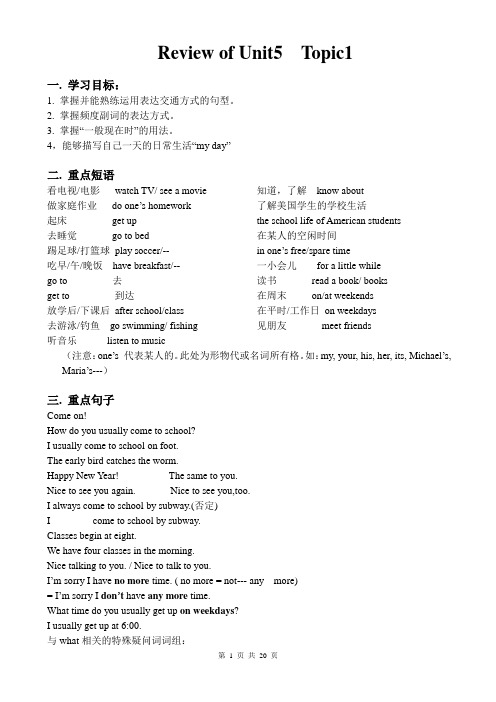
Review of Unit5 Topic1一. 学习目标:1. 掌握并能熟练运用表达交通方式的句型。
2. 掌握频度副词的表达方式。
3. 掌握“一般现在时”的用法。
4,能够描写自己一天的日常生活“my day”二. 重点短语看电视/电影watch TV/ see a movie 做家庭作业do one’s homework起床get up去睡觉go to bed踢足球/打篮球play soccer/--吃早/午/晚饭have breakfast/--go to 去get to 到达放学后/下课后after school/class去游泳/钓鱼go swimming/ fishing 听音乐listen to music 知道,了解know about了解美国学生的学校生活the school life of American students 在某人的空闲时间in one’s free/spare time一小会儿for a little while读书read a book/ books在周末on/at weekends在平时/工作日on weekdays见朋友meet friends(注意:one’s 代表某人的。
此处为形物代或名词所有格。
如:my, your, his, her, its, Michael’s, Maria’s---)三. 重点句子Come on!How do you usually come to school?I usually come to school on foot.The early bird catches the worm.Happy New Year! The same to you.Nice to see you again. Nice to see you,too.I always come to school by subway.(否定)I ______ come to school by subway.Classes begin at eight.We have four classes in the morning.Nice talking to you. / Nice to talk to you.I’m sorry I have no more time. ( no more = not--- any more)= I’m sorry I don’t have any more time.What time do you usually get up on weekdays?I usually get up at 6:00.与what相关的特殊疑问词词组:What time 问时间问颜色What color 问班级What class问年级What grade 问星期What day四.疑难讲解1. 交通方式的表达go/come to +地点+ by + 交通工具= go/come to +地点+ in/on a/an/the + 交通工具= take a/ an/ the + 交通工具+ to +地点ride a bike todrive a car towalk tofly toEg: I usaually come to school by bus.= I usually_____ ____ _____ to school.= I usually _____ to school ____ ______ ________.提问:How do you usually come to school.2. 频率副词:always, usually, often, sometimes, seldom, never. 通常放在句中be,来modal.v, 助动词之后,行为动词之前。
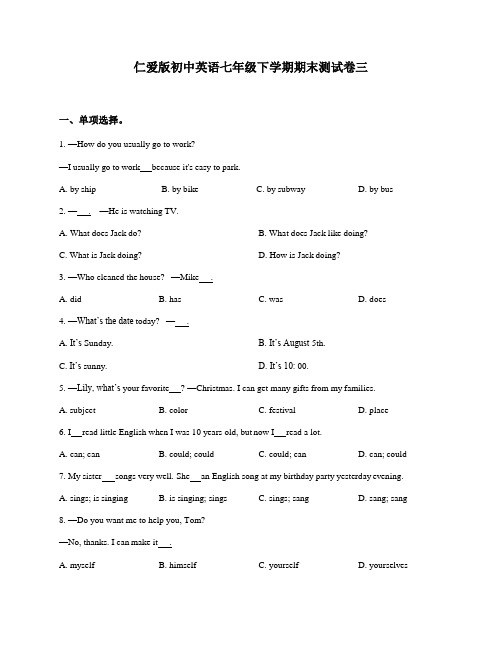
仁爱版初中英语七年级下学期期末测试卷三一、单项选择。
1.—How do you usually go to work?—I usually go to work because it's easy to park.A. by shipB. by bikeC. by subwayD. by bus2.—. —He is watching TV.A. What does Jack do?B. What does Jack like doing?C. What is Jack doing?D. How is Jack doing?3.—Who cleaned the house? —Mike .A. didB. hasC. wasD. does4.—What’s the date today? —.A. It’s Sunday.B. It’s August 5th.C. It’s sunny.D. It’s 10: 00.5.—Lily, what’s your favorite ? —Christmas. I can get many gifts from my families.A. subjectB. colorC. festivalD. place6.I read little English when I was 10 years old, but now I read a lot.A. can; canB. could; couldC. could; canD. can; could7.My sister songs very well. She an English song at my birthday party yesterday evening.A. sings; is singingB. is singing; singsC. sings; sangD. sang; sang8.—Do you want me to help you, Tom?—No, thanks. I can make it .A. myselfB. himselfC. yourselfD. yourselves9.—Look at the sign, "No Parking”.—Oh, sorry. I see it.A. don’tB. didn’tC. can’tD. couldn’t10.—How was the weather yesterday?—It was We made a snowman in the park.A. sunnyB. windyC. rainyD. snowy11.You’d better your smart phone(手机)when you are driving. It’s not safe.A. useB. to useC. not useD. not to use12.Many people go to Tian’anmen Square to watch the national flag every morning.A. put upB. go upC. get upD. stay up13. —How is the weather in spring?—It’s warm. It’s a good season .A. travel aroundB. to travel aroundC. for travelling aroundD. Both B and C14.Which of the following sentences(句子)is correct(正确的)?A.It’s very hot in August in most parts of China.B.He always go to work by bus last year.C.Tomorrow is Mary’s 13 birthday.D.Tom would like visit some places of interest in Henan.15.—My mother will take me to visit my uncle next week—.A. You’re right.B. That’s easy.C. I’d love to.D. Have a good time!二、完形填空There is a little girl. She is six years old. One day she asks her parents, “ 1 do you call me April” “ Because you were born 2 April, "says her mother. The little girl is happy to know that, She likes her 3 April likes the 4 , too, because her parents 5 have a birthday party for her in that month. All her friends come and have a great time at the party.Last week, April got a little 6 . Everyone came to visit her family. They talked about names for the 7 baby.April 8know why they did this. She thought it’s9for her to give a name to the baby. "He was born in February, 10 we should call him February, "she thought.1. A. How B. Why C. What D. Which2. A. in B. on C. at D. from3. A. family B. clothes C. gift D. name4. A. day B. week C. month D. year5. A. always B. often C. seldom D. never6. A. friend B. cousin C. brother D. sister7. A. new B. lucky C. special D. important8. A. can’t B. didn’t C. couldn’t D. shouldn’t9. A. boring B. easy C. difficult D. interesting10. A. and B. or C. but D. so三、阅读语言材料, 然后按文后要求做题。
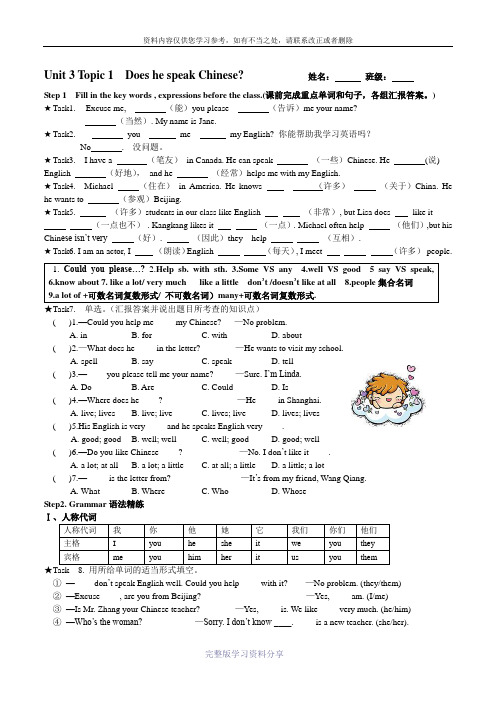
Unit 3 Topic 1 Does he speak Chinese? 姓名:班级:Step 1 Fill in the key words , expressions before the class.(课前完成重点单词和句子,各组汇报答案。
)★Task1. -- Excuse me, (能)you please (告诉)me your name?-- (当然). My name is Jane.★Task2. -- you me my English? 你能帮助我学习英语吗?--No . 没问题。
★Task3. I have a (笔友)in Canada. He can speak (一些)Chinese. He (说) English (好地),and he (经常)helps me with my English.★Task4. Michael (住在)in America. He knows (许多)(关于)China. He he wants to (参观)Beijing.★Task5. (许多)students in our class like English (非常), but Lisa does like it (一点也不). Kangkang likes it (一点). Michael often help (他们),but his Chin ese isn’t very (好). (因此)they help (互相).★Task6. I am an actor, I (朗读)English (每天), I meet (许多)people.1. Could you please…?2.Help sb. with sth.3.Some VS any4.well VS good 5 say VS speak,6.know about7.like a lot/ very much like a little don’t /doesn’t like at all8.people集合名词9.a lot of +可数名词复数形式/ 不可数名词)many+可数名词复数形式.★Task7. 单选。
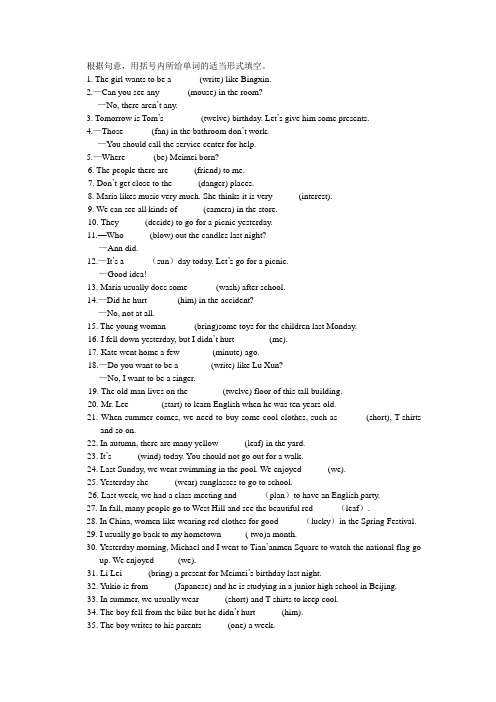
根据句意,用括号内所给单词的适当形式填空。
1. The girl wants to be a ______(write) like Bingxin.2.—Can you see any ______(mouse) in the room?—No, there aren’t any.3. Tomorrow is Tom’s ________(twelve) birthday. Let’s give him some presents.4.—Those ______(fan) in the bathroom don’t work.—You should call the service center for help.5.—Where ______(be) Meimei born?6. The people there are _____ (friend) to me.7. Don’t get close to the _____ (danger) places.8. Maria likes music very much. She thinks it is very _____ (interest).9. We can see all kinds of _____ (camera) in the store.10. They _____ (decide) to go for a picnic yesterday.11.—Who _____ (blow) out the candles last night?—Ann did.12.—It’s a _____(sun)day today. Let’s go for a picnic.—Good idea!13. Maria usually does some ______(wash) after school.14.—Did he hurt ______ (him) in the accident?—No, not at all.15. The young woman ______(bring)some toys for the children last Monday.16. I fell down yesterday, but I didn’t hurt _______ (me).17. Kate went home a few _______(minute) ago.18.—Do you want to be a _______(write) like Lu Xun?—No, I want to be a singer.19. The old man lives on the _______ (twelve) floor of this tall building.20. Mr. Lee _______(start) to learn English when he was ten years old.21. When summer comes, we need to buy some cool clothes, such as ______(short), T-shirtsand so on.22. In autumn, there are many yellow _____ (leaf) in the yard.23. It’s _____ (wind) today. You should not go out for a walk.24. Last Sunday, we went swimming in the pool. We enjoyed _____ (we).25. Yesterday she _____ (wear) sunglasses to go to school.26. Last week, we had a class meeting and _____(plan)to have an English party.27. In fall, many people go to West Hill and see the beautiful red _____(leaf).28. In China, women like wearing red clothes for good _____(lucky)in the Spring Festival.29. I usually go back to my hometown _____( two)a month.30. Yesterday morning, Michael and I went to Tian’anmen Square to watch the national flag goup. We enjoyed _____(we).31. Li Lei _____ (bring) a present for Meimei’s birthday last night.32. Y ukio is from _____ (Japanese) and he is studying in a junior high school in Beijing.33. In summer, we usually wear _____ (short) and T-shirts to keep cool.34. The boy fell from the bike but he didn’t hurt _____ (him).35. The boy writes to his parents _____ (one) a week.36. Many students _____ (believe) Kangkang will do well in the race.37.—Do you like _____ (grape)?—Yes, they’re delicious.38. In China, many people think they’ll be _____ (luck) in red clothes on New Year’s Day.39. The man _____ (shout) at me a few minutes ago.40. Keep the windows _____ (open), please. It’s a little hot in the room.41. It’s raining _____ (heavy). We should stay at home.42. —Did you have a good time at the party?—Yes, we enjoyed _____ (us).43. The _____ (leaf) often turn yellow and fall from the trees in autumn.44. I always think I’m a _____ (luck) boy.45. The woman _____ (carry) her baby on the back and went to the bus station.46. They have two _____( ticket)for the movie.47. My leg _____(hurt) , so I can’t walk now.48. We should look both ways _______ (before)we go across the roads.49. Turn left at the first _____(cross). You’ll find it on your right.50. The ______ (public)services in this area are very nice.。

(七年级下)Lesson ThreeSection A1. A: What day is it today? 今天星期几?B: It’s Wednesday. 今天星期三。
2. A: What are they doing? 他们正在做什么?B: They are having a math class. 他们正在上数学课。
3. A: What do you think of history? 你觉得历史怎么样?B: It’s easy and interesting.它又容易又有趣。
(I don’t like it. It’s a little difficult)我不喜欢它。
它有点儿难。
Section BMonday /' mʌnd ei/ 星期一Tuesday /'tju:zdei/ 星期二Wednesday /'wenzdei/ 星期三Thursday /'θɜ:zdeɪ/ 星期四Friday /'fraidei/ 星期五Saturday /' sætədeɪ/ 星期六Sunday /' sʌndei/ 星期天subject /' sʌbdʒekt / 学科math / mæθ/ 数学history / ' hɪstəri/ 历史P.E. 体育art /a:t/ 美术,艺术music / ' mju:zik/ 音乐science /' saiəns/ 科学physics /'fiziks/ 物理easy /' i:zi/ 容易interesting /'ɪntrəstɪŋ/ 有趣的difficult /' difikəlt/ 难的Section C1. 注意以下时间表达的区别:①what day 星期几例如:What day is it today? 今天星期几?②what’s the date 几号例如:---What’s the date today? 今天几号?---It’s February 28. 今天是二月28日。
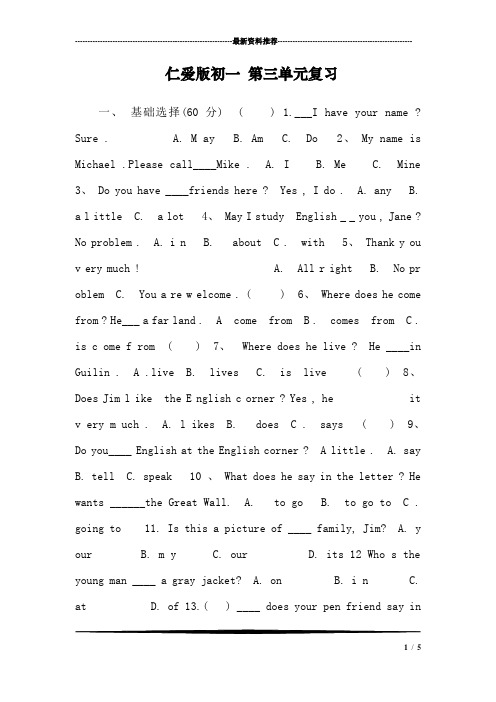
---------------------------------------------------------------最新资料推荐------------------------------------------------------仁爱版初一第三单元复习一、基础选择(60 分) ( ) 1.___I have your name ? Sure . A. M ay B. Am C. Do 2、 My name is Michael .Please call____Mike . A. I B. Me C. Mine3、 Do you have ____friends here ? Yes , I do . A. any B.a l ittle C. a lot 4、 May I study English _ _ you , Jane ? No problem . A. i n B. about C . with 5、 Thank y ouv ery much ! A. All r ight B. No pr oblem C. You a re w elcome . ( ) 6、 Where does he come from ? He___ a far land . A come from B . comes from C .is c ome f rom ( ) 7、 Where does he live ? He ____in Guilin . A .live B. lives C. is live ( ) 8、Does Jim l ike the E nglish c orner ? Yes , he itv ery m uch . A. l ikes B. does C . says ( ) 9、Do you____ English at the English corner ? A little . A. say B. tell C. speak 10 、 What does he say in the letter ? He wants ______the Great Wall. A. to go B. to go to C . going to 11. Is this a picture of ____ family, Jim? A. your B. m y C. our D. its 12 Who s the young man ____ a gray jacket? A. on B. i n C.at D. of 13.( ) ____ does your pen friend say in1 / 5his letter? He likes China a lot. A. Who B. Where C.What D. Which 14.You speak English so well. Can youhelp ____ with ____ English? A. I ; m e B. me; mineC. I ; myD. me; my 15.I can speak English now, ____ onlya little. A. but B. a nd C. or D. s o 16. Do Jim and Kate have ____ friends here? A. s ome B. any C. a D. a n 17.( ) Herparents ____ English teachers. A. a re a ll B. alla re C. a re both D.b oth a re 1⒏ Thebedroom is ____ . A. of Lucy and Lily B. L ucy s and Lilys C. Lucy s and Lily D. Lucy and Lily s 1⒐ Uncle Wangis a farmer. He works ____ the Red Star Farm. A. o n B. i n C. at D. t o 20 Iwant to go to WC. Please ____ my schoolbag. A. l ook a t B. l ook a fter C. l ook l ike D. s ee 21.My family ____ very big. A. a m B. i s C. a re D. does 22. His father and mother ____ teachers. A. a re both B.are a ll C. bot h are D. all a re 23. Mrs. Zhang is ____office worker. A. a B. a n C. / D. t he 24. ____does he work? In a hospital. A. What B. How C. Who D.Where 25. What does Jack do? ____ A. Hes good. B. Hes fine.C. Hes well.D. Hes a student. 26. Mom isnt in today. I look---------------------------------------------------------------最新资料推荐------------------------------------------------------____ my little sister. A. at B. after C. like D. thesame 27. The man in brown is ____ father. A. Lucy s and Lilys B. Lucy s and Lily C. Lucy and Lily s D. Lucy and Lily 28.Come in (进来) and have a seat, please. ____ A. Thanks alot. B. That s O K. C. You re welcome. D. I m glad. 29. Yourmothers brother is your ____. A. a unt B. unc le C.brother D. gr andfather 30. Tom and Kate are ____. A.brothers and sisters B. brothers and sister C. brother andsister D. sisters and brother 二.完型填空。
2013年仁爱英语七年级下总复习三Unit 7复习提纲Topic1一、单词与词组1、月份名词:January, February, March, April, May, June, July, August, September, OctoberNovember, December2、序数词:first, second, third, fourth, fifth, sixth seventh, eighth, ninth, tenth, twelfth twentieth,twenty- first, twenty-ninth, thirtieth, thirty-first…(P57-58)3、其它: writer, was, born, fan, were, thousand, birthday, date, calendar, plan, celebrate, party,present, shape, ball, afraid, star, mouse(pl. mice), square, circle, cake, Mrs.4、词组:be born, a big fan of sb., have a birthday party, plan to do sth., be afraid, make abirthday cake, be like, use…for, cook a big dinner, buy sth. for sb.二、重点语法1、学习问出生日期及地点。
When/Where were you born? I was born in…2、学习序数词及日期的表达方法。
What’s the date today? It’s May 13th.3、be动词一般过去时的基本用法。
4、学习问物品的形状及用途。
What’s the shape of…?/ What shape is…?三、重点句型及交际用语:1、-When was she born? -She was born in July, 1965.2、-Where was she born? - She was born in Wales, the UK.3、You are a big fan of J.K.Rowling.4、-When is your birthday? -May 13th.5、-What’s the date today? -It’s May 8th.6、-How do plan to celebrate it? -My friends want to have a birthday party for me.7、-What is your present for Kangkang’s birthday? -It’s a soccer ball.8、-What’s the shape of your present? -It’s round.9、-May I have a look? -Sorry, I’m afraid you can’t.10、-Was it like a flower before? -No, it was n’t.. It was like a star.11、-What shape was it before? -It was a square.12、- How long/wide is it? -It is …centimeters long/wide.13、-What do we use it for? -We use it to….四、作文点:My Birthday或My Friend’s BirthdayLi Ming下个星期天(May 19th)要过生日,他的父母亲将在家为他举办一个生日舞会。
假设你是他最好的朋友,准备去参加他的生日舞会并送给他一件礼物。
请根据上面的提示写一篇短文,不少于60个单词。
My Friend’s BirthdayLi Ming i s my best friend. His birthday is on May 19th. It next Sunday. His parents plan to have a birthday party for him. He asks me to come to his birthday party. I tell him I’m going there on time. I want to buy a present for him. Li Ming likes listening to music very much. So I plan to buy an MP5 for him. I think he must like it a lot.***序数词记忆口诀***一二三单独记,要从四加起;八减t,九去e;ve要用f替,ty变成tie,再把th加上去。
若遇“几十几”或“几百几”,只变个位就可以。
Unit7 Topic2一、单词与词组:1、单词:piano, else, disco, perform, ballet, smart, count, ago, London, word2、词组:play the+乐器名词, play +球类名词,sing Chinese/English songs, dance to disco, perform ballet, have a good time, take sb./sth. to sw., so many+名词(复数),时间+ago, at the age of, not…any more, with one’s help=with the help of sb.二、重点语法1、学习情态动词can/can’t的用法。
can表现在会做的事情,can’t表现在不会做的事情。
2、学习情态动词could/couldn’t的用法。
could表过去会做的事情,couldn’t表过去不会做的事情。
3、初步学习选择疑问句。
(1)基本结构:(A)一般疑问句+or+对照选择项。
Eg. Do you like English or Chinese?(B)特殊疑问句+A选择项+or+B选择项eg. When can you come back, today or tomorrow?(2)用法:选择疑问句不用或来回答,一般情况下是就供选择的两项或三厢中的一项进行回答。
Eg. -Are you a student or a teacher? -I’m a student.-Which do you like, basketball or soccer ball? -I like soccer ball.三、重点句型及交际用语:1、-Would you like to sing with me?-Yes, I’d love to. But I can’t sing Chinese songs, I can only sing English songs.2、-What else can you/she do? -I/She can dance and play the guitar.3、I can also perform ballet.4、I’m sure we’ll have a good time at the party.5、-Happy birthday to you! -Thank you.6、You are so smart.7、I’d like to take these flowers to the party. 8、I can’t count so many flowers.9、-Can Ann dance or draw? -She can dance. She can do it very well/a little.10、But one year ago, she couldn’t do it at all.11、But when she was five, she could dance just a little..12、They both like playing ball games.13、The children are all having a good time.14、At the age of five, she could play the piano very well.15、When she was six, there was something wrong with her eyes.16、Jenny could not see anything any more.17、With her mother’s help, Jenny can write well now.四、作文点:两年前,李梅不会说英语,那时她认为学英语很难。
去年她去向老师请教了如何学习英语。
写一篇不少于60个单词的短文,描述老师是如何指导她的,现在她学得怎样了。
提示词:good student, speak English, at that time(在那时),difficult, do more listening and speaking practices(多做听说练习),now, well, talkLi Mei is a good student, but she could not speak English two years ago. She thought it was difficult and boring. She didn’t like it at all. It was hard for her to study English well at that time. Her teacher helped her a lot. He asked her to do more listening and speaking practices. Now she can speak English well. She can talk with others in English.Unit7 Topic3一、单词与词组:1、有关生日聚会的词:magic, trick, candle, kung fu, wish2、动词及过去式:enjoy-enjoyed, wash-washed, wish-wish, fall-fell, forget-forgot, bring-brought,blow-blew,3、其它:himself, yesterday, matter, myself, poor, everyone, sunny, delicious4、词组:perform magic tricks/Chinese kung fu, enjoy oneself, fall down, hurt oneself, wash one’shands/face, at once, buy sth. for sb., make cards by hand, make a wish, blow out,二、重点语法掌握行为动词一般过去时的用法,包括其书写规则和读音规则以及各种句型结构。